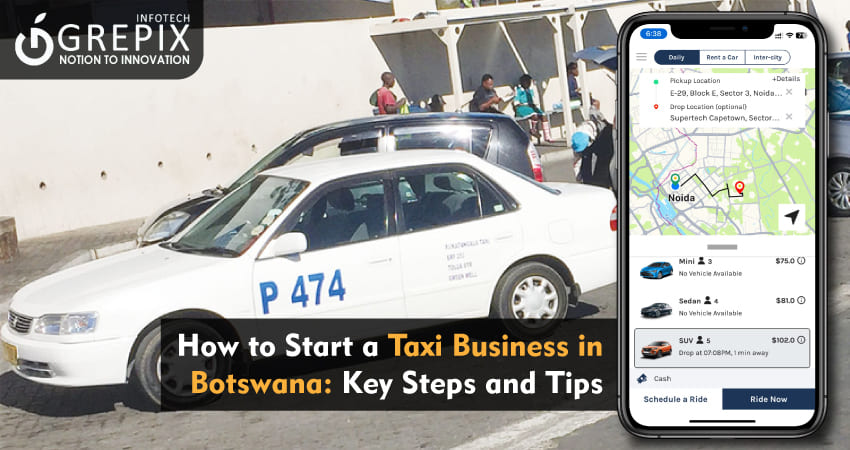How to Start a Taxi Business in Botswana: Key Steps and Tips
Starting a taxi business in Botswana involves strategic planning, a clear understanding of the market, and a commitment to delivering excellent service. From legal requirements to scaling operations, every step plays a crucial role in your success. With determination and smart decisions, you can create a thriving business that meets the transportation needs of your community.
Launching a taxi business in Botswana can be a lucrative venture, given the growing demand for reliable transportation services in the country. With a steady economy, expanding urban areas, and a rising middle class, the taxi industry presents significant opportunities for entrepreneurs. This guide will walk you through the steps needed to start and run a successful taxi business in Botswana.
Starting a taxi business in Botswana offers significant potential, driven by urban growth, a steady economy, and increasing transportation demands. Success requires strategic planning, market research, and exceptional customer service. Entrepreneurs must focus on meeting legal requirements, selecting reliable vehicles, and leveraging technology for efficient operations. Challenges like competition and operational costs can be managed through innovative marketing, competitive pricing, and excellent service delivery. Partnering with Grepix Infotech, a leading taxi app development company, ensures your business stays competitive. Their user-friendly taxi apps enable seamless booking, real-time tracking, and cashless payments, helping you deliver a modern, tech-driven transportation service in Botswana.
1Understanding the Taxi Business in Botswana
Market Demand for Taxi Services
Botswana’s cities, such as Gaborone and Francistown, are experiencing increased urbanization, leading to higher demand for transportation services. Tourists also contribute to the need for taxis, particularly in areas close to national parks and game reserves.
Types of Taxi Services You Can Offer
- Metered Taxis: Standard taxis with fixed fares based on distance.
- Ride-Hailing Services: Utilizing apps like Uber or Bolt for modern convenience.
- Shared Taxis: Affordable options where passengers share rides and costs.
Challenges in the Taxi Business
Like any business, running a taxi service in Botswana comes with challenges, including high fuel prices, maintenance costs, and competition from established operators. However, with proper planning and execution, these obstacles can be overcome.
2Conducting Market Research
Identifying Target Customers
Your target audience could include daily commuters, tourists, corporate clients, and event-goers. Understanding their preferences will help tailor your services to meet their needs.
Analyzing the Competition
Study the existing taxi operators in your area to identify gaps in the market. What are they doing well? Where are they falling short? Use this information to differentiate your service.
Choosing the Right Location
Locations with high foot traffic, such as shopping malls, airports, and business districts, are ideal for taxi operations. A central location can also help minimize dead mileage and fuel costs.
3 Legal Requirements for Starting a Taxi Business in Botswana
Registering Your Business
You must register your taxi business with the Companies and Intellectual Property Authority (CIPA) in Botswana. Choose an appropriate business structure, such as a sole proprietorship or limited company.
Taxi Operating License
Obtaining a taxi operating license is mandatory. Contact the Ministry of Transport and Communications to understand the requirements and application process.
Vehicle Insurance and Compliance
Ensure your vehicles are insured for commercial use. Additionally, adhere to all safety and emission regulations to avoid fines and penalties.
4 Planning Your Taxi Business
Creating a Business Plan
A well-structured business plan should include your business goals, market analysis, financial projections, and growth strategies. It will also be essential for securing funding.
Setting a Budget
Estimate the costs involved, including vehicle purchase, licensing fees, insurance, fuel, and maintenance. Allocate funds for marketing and emergency expenses as well.
Securing Financing
If you lack sufficient capital, consider options such as bank loans, microfinance institutions, or investor partnerships. Present your business plan to demonstrate the viability of your venture.
5Choosing the Right Vehicles
Factors to Consider When Buying Vehicles
Selecting the right vehicles is crucial to the success of your taxi business. Consider the following factors:
- Affordability: Choose taxis that fit your budget without compromising quality.
- Fuel Efficiency: Opt for fuel-efficient models to reduce operational costs.
- Comfort and Safety: Ensure your vehicles are comfortable for passengers and equipped with essential safety features.
New vs. Used Vehicles
- New Vehicles: They come with warranties and lower maintenance costs initially but are more expensive upfront.
- Used Vehicles: These are budget-friendly but may require frequent repairs and maintenance.
Assess your financial capacity to decide between new and used vehicles while ensuring they meet regulatory standards.
Maintenance and Repair Considerations
Routine maintenance keeps your vehicles in optimal condition. Partner with trusted mechanics and maintain a servicing schedule to prevent unexpected breakdowns. Always budget for spare parts and emergency repairs.
6Building a Strong Team
Hiring Qualified Drivers
Your drivers are the face of your business. Hire individuals with:
- A valid driver’s license and clean driving record.
- Strong communication and customer service skills.
- Knowledge of local routes and traffic laws.
Conduct thorough background checks to ensure reliability.
Training Drivers
Training enhances professionalism and ensures drivers understand customer service standards, traffic rules, and emergency protocols. Provide workshops or partner with local driving schools for advanced training.
Administrative and Customer Support Staff
Depending on the size of your business, you may need dispatchers, customer service representatives, and accountants. A strong support team ensures seamless operations and enhances customer satisfaction.
7Implementing Technology
Using GPS and Navigation Tools
Equipping your taxis with GPS systems improves route efficiency, reduces fuel costs, and provides real-time location updates to customers.
Setting Up a Booking System
A booking system streamlines reservations. Options include:
- Online Platforms: A website or mobile app for easy bookings.
- Call Centers: Allowing customers to book via phone.
Leveraging Ride-Hailing Apps
Consider partnering with established ride-hailing platforms like Bolt or developing your app to reach tech-savvy customers. Ensure the app includes features like fare calculation, driver tracking, and customer feedback.
Also Read: "Accelerating Your Fortune: Becoming a Billionaire in South Africa's Taxi Industry"
8Developing a Marketing Strategy
Creating a Brand Identity
Your brand identity sets you apart. Create a memorable logo, catchy slogan, and consistent branding across your vehicles, website, and marketing materials.
Promoting Your Services
- Online Marketing: Use social media platforms like Facebook and Instagram for promotions. Run targeted ads to reach potential customers.
- Traditional Advertising: Distribute flyers, place ads in local newspapers, and collaborate with radio stations for broader reach.
Building Partnerships
Partner with hotels, airports, event organizers, and travel agencies to secure consistent clientele. Offering special packages or discounts to partners can boost your business.
9Managing Operations
Scheduling and Dispatching
Use scheduling tools to assign rides efficiently. This minimizes delays and improves the overall customer experience.
Ensuring Customer Satisfaction
Encourage feedback from customers to identify areas of improvement. Train drivers to prioritize courteous and timely service to build a loyal customer base.
Monitoring Performance Metrics
Track key metrics such as revenue, expenses, driver performance, and customer reviews. Use this data to make informed decisions and optimize operations.
10Scaling Your Taxi Business
Adding More Vehicles
As demand grows, expand your fleet gradually. Invest in vehicles that align with your service standards and customer needs.
Expanding to New Locations
Explore opportunities in underserved areas or neighboring towns. Conduct feasibility studies before expanding to ensure profitability.
Diversifying Services
Introduce additional services, such as airport transfers, corporate packages, or premium taxi options, to cater to different customer segments.
11Overcoming Common Challenges
Handling Competition
Differentiate your business through exceptional service, competitive pricing, and innovative marketing. Offer unique perks, such as loyalty programs or free Wi-Fi in taxis.
Managing Operational Costs
Keep costs in check by investing in fuel-efficient vehicles, scheduling regular maintenance, and using technology to optimize routes.
Dealing with Regulatory Changes
Stay updated on industry regulations and adjust your operations accordingly. Build a relationship with regulatory bodies for smoother compliance.
Conclusion
Starting a taxi business in Botswana is a promising venture, driven by urbanization, economic growth, and rising transportation needs. Success requires careful planning, compliance with legal requirements, and a focus on delivering exceptional customer service. Leveraging technology and maintaining efficient operations are key to standing out in this competitive market.
Partnering with Grepix Infotech, a leading taxi app development company, can provide a technological edge to your business when it needs to thrive. Grepix’s innovative and user-friendly taxi apps streamline booking, enable real-time tracking, and support cashless payments, ensuring an enhanced customer experience and efficient operations.
With Grepix Infotech as your trusted partner, you can confidently launch a modern, tech-driven taxi service that meets the evolving needs of Botswana’s growing urban and tourist markets. Take the first step today with Grepix and elevate your taxi business to new heights.
FAQs
1. What is the average cost of starting a taxi business in Botswana?
The cost can vary widely but typically includes vehicle purchase, licensing fees, insurance, and operational expenses. A rough estimate could range from P100,000 to P500,000, depending on the scale of your business.
2. How can I differentiate my taxi service from competitors?
Focus on customer service, affordability, and reliability. Offering conveniences like cashless payments, loyalty programs, or eco-friendly vehicles can also set you apart.
3.What licenses are required to operate a taxi business?
You’ll need a taxi operating license, business registration, and commercial vehicle insurance. Check with the Ministry of Transport and Communications for specific requirements.
4. How profitable is a taxi business in Botswana?
Profitability depends on factors like location, competition, and operational efficiency. By maintaining high standards and managing costs, a taxi business can be highly lucrative.
5. Can I start a taxi business with one car?
Yes, starting with a single vehicle is a viable option. Focus on building a strong reputation and expanding gradually as your business grows.
Looking out to start your own venture like Bolt? Try out our HireMe Taxi Bolt Clone, the easiest way to kick-start your taxi business.







